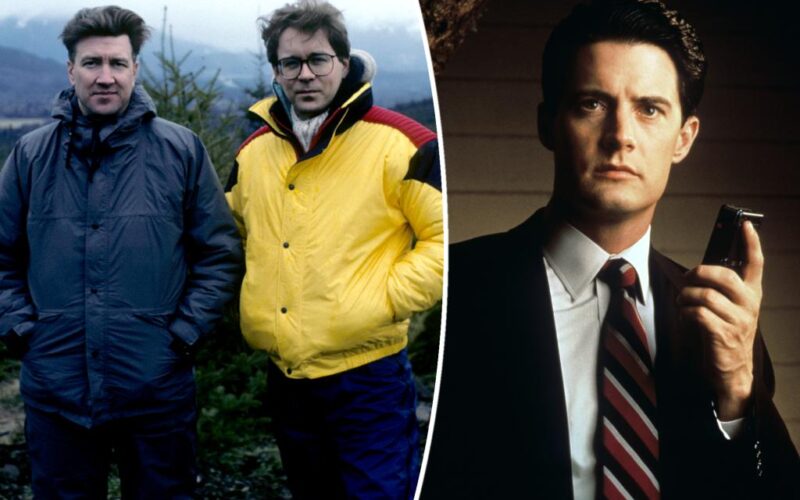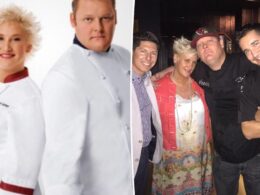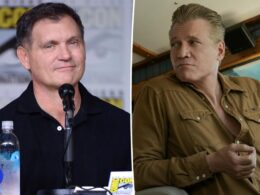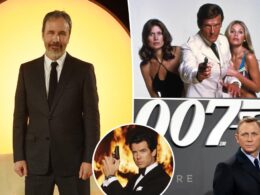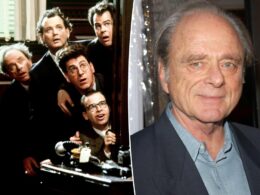The owls are not what they seem.
David Lynch and Mark Frost’s cult hit “Twin Peaks” celebrated its 35th anniversary this year – and now, the two-season series, plus its 2017 sequel “Twin Peaks: The Return,” are streaming on the Mubi platform starting Friday, June 13.
“The only time [ABC network execs] ever tried to give us notes was after they had read the pilot,” Frost, 71, exclusively told the Post. “And they said, ‘Now we’ve got a few thoughts. Would you like to hear them?’ And they pulled out their notes, and David just said, ‘No.’”
Frost quipped, “They just put their notes back in their pocket.”
“Twin Peaks” first premiered on ABC in 1990, and ran for two seasons, before it returned for Showtime’s “Twin Peaks: The Return” in 2017.
Set in the fictional titular town, the story followed FBI special agent Dale Cooper (Kyle MacLachlan) investigating the murder of local teen Laura Palmer (Sheryl Lee). Madchen Amick, Sherilynn Fenn, Lara Flynn Boyle and Michael Ontkean also starred. The story was surreal, filled with supernatural elements and dream sequences.
It was also a hit, raking in over 17 million viewers when it debuted in 1990.
“The only people it really seemed to puzzle or disturb were veteran network development people,” Frost explained.
“It was like we’d invented a new kind of math, and they didn’t understand it, and it bothered them,” he continued. “It ran against their belief that they knew what they were doing, and that nobody else should do it any other way.”
Under pressure from the network, Season 2 of “Twin Peaks” did reveal the answer to the mystery of who killed Laura (it was her father, Leland Palmer, who was possessed by Bob, an evil spirit).
The co-creator and the late Lynch were “in agreement” about not revealing that, but the network execs “really were in a hurry to get this thing over with.”
“I think the show made them deeply uncomfortable – even though they didn’t mind the Super Bowl numbers we got when we debuted, and the fact that there was more critical attention being paid to ABC than they’d seen in about five years as a result,” Frost told the Post.
Although ABC is now owned by Disney, it was owned by the company Capital Cities at the time.
“It didn’t fit their idea of what a show should be. So they were, I think, irritated by it in some ways. And they wanted us to just get on with it and solve [the mystery],” Frost explained. “And we kept telling them ‘that’s a huge mistake.’ They wouldn’t renew us for a second season until we gave them our word that we would solve it in the second season.”
Frost said that he “fought it off” as long as he could.
“David and I still were in agreement that it might’ve been more interesting had it never been solved. It was really what Hitchcock used to call ‘the MacGuffin’ that got us into the story. And once you solve the MacGuffin, you remove some of the magic.”
According to Frost, that was the only time that the network “basically put an iron fist and a velvet glove and gave us that message.”
“They were too baffled by [the show] to really mount a cohesive counterargument,” he added. “But, they were on me constantly about it.”
Frost recalled that “a pestering little junior executive” was assigned “to hector me about it.”
But Frost was a seasoned TV veteran, having previously worked on “Hill Street Blues,” so he was unfazed.
“I was used to that sort of thing … and we just, for the most part, disregarded it.”
“Twin Peaks” has influenced countless other shows and movies, from “Lost” to “True Detective” to “Riverdale.”
“It’s always flattering to hear that somebody found something in your work that inspired them in some way. I think the one that was most meaningful to me was talking to David Chase, when ‘The Sopranos’ really hit,” said Frost.
He recalled that Chase told him that when “Twin Peaks” used dreams and “plunged into the subconscious,” that gave “The Sopranos” creator, “the courage to try it with these mobsters in New Jersey. And I thought, well, that’s pretty cool.”
Lynch died in January of cardiac arrest due to chronic obstructive pulmonary disease. He was 78.
The last time he spoke to Lynch was in Dec. 2024.
“When I finally found out about his diagnosis of emphysema, it’s a very serious deal. My grandfather died of it … So, I just wanted to say hello and wish him well. It was very clear it wasn’t gonna affect his creativity, and his will to work. It just was slowing him down physically.”
“We weren’t sentimental types, but we had one last cup of coffee together,” he went on. “I think we both knew it was the last one. It was pretty poignant. Sometimes you’re here today, gone tomorrow. So, you have to appreciate and love the people that you’re with, because you never know.”
Following Lynch’s death, public tributes rolled in. But Frost said he still feels that the “Mulholland Drive” filmmaker wasn’t fully understood, in one key way.
“I’m not sure people fully realize how funny he was … There were always moments of levity and lightness [in his work], but left to his own devices, he was interested in very dark themes,” he said. “But as a person, to the people who knew him best, he was one of the most delightful, lighthearted, friendly human beings you’d ever want to know.”
“And he was a constant joy and surprise, because his mind worked like nobody else I’ve ever met. We had a heck of a good time making our little show, and the fact that it’s lasted all these years is gravy.”
About whether the world of “Twin Peaks” could ever continue, Frost said, “It’s too early for me to say. It’s hard to imagine going back there without David.”
However, he did write some novels that expanded the “Twin Peaks” universe.
“So maybe that’s a way to do it. But, I haven’t really figured that out yet,” he told The Post. “I’m kind of waiting for the moment when the light comes on and says, ‘Okay. Something’s cooking.’”




